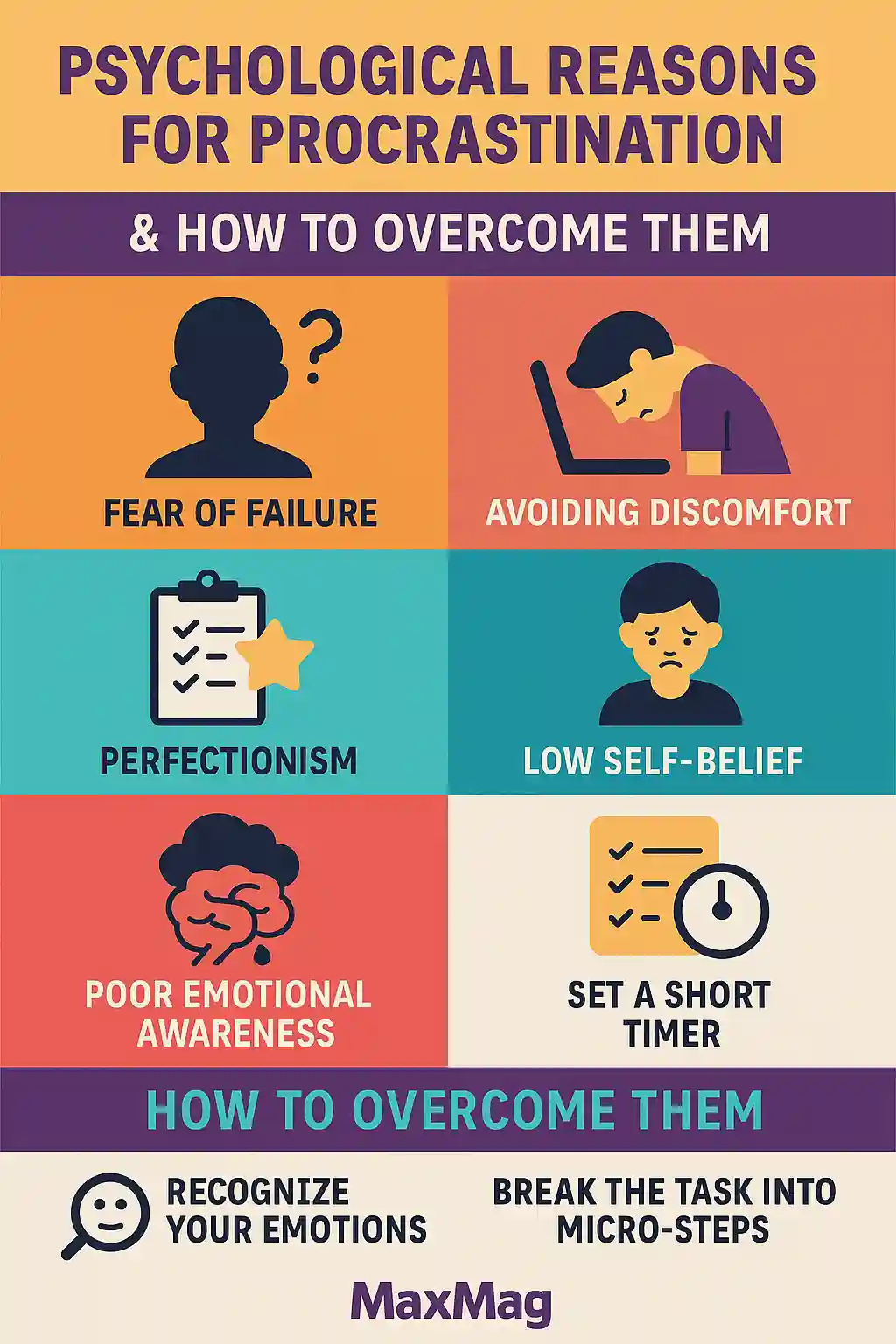
Procrastination isn’t just putting things off—there’s a deeper story behind it. For many of us, it’s not about poor time management or laziness, but a mental tug-of-war driven by fear, stress, and hidden emotional responses. The psychological reasons for procrastination are complex, rooted in how our brain tries to avoid discomfort and protect us from perceived threats, even if that protection comes at a cost.
We might delay tasks we care about not because we’re unmotivated—but because we care too much. We fear failure, rejection, or the possibility that we won’t live up to our own expectations. The brain, in an effort to protect us from emotional discomfort, nudges us toward avoidance. And suddenly, scrolling social media or reorganizing a drawer feels more urgent than finishing that report.
But there are ways to understand this mental loop—and break free from it.
Why Do We Procrastinate? It’s All in the Mind
To beat procrastination, we have to first understand the internal mechanisms behind it. These are the most common psychological reasons for procrastination:
1. Fear of Failure
When we delay, it often isn’t due to lack of ambition. Instead, it stems from an internal voice whispering, What if I mess up? For many, starting a project becomes terrifying because failure might reflect poorly on our identity. It’s not just the task that feels threatening—it’s what that task says about us.
2. Avoiding Discomfort
Let’s face it: some tasks are just unpleasant. Writing an essay, making a phone call, or tackling finances can trigger anxiety or boredom. Instead of facing those emotions, our brain searches for an easier, more pleasant distraction. Procrastination becomes a tool for emotional regulation, even if we know it’s self-defeating.
3. Perfectionism
Sometimes, the bar is set so high we never feel ready to begin. We tell ourselves, If I can’t do it perfectly, I shouldn’t do it at all. This type of thinking leads to paralysis. Starting something imperfectly feels more threatening than not starting at all.
4. Low Self-Belief
If you’ve ever thought, I’m just not good at this, you’ve experienced the demotivating power of low self-efficacy. When we doubt our ability to complete a task, we avoid it. This is especially common in academic and professional settings, where performance is closely watched.
5. Poor Emotional Awareness
Often, we procrastinate without fully understanding why. If we’re not in tune with what we’re feeling—stress, shame, doubt—we may act out those emotions by avoiding responsibilities. Emotional clarity is the first step to reversing this pattern.
H2: Psychological Reasons for Procrastination in Daily Life
Let’s apply the psychological reasons for procrastination to everyday situations:
-
A college student delays starting a paper not because she’s lazy, but because she’s afraid the professor will judge her work harshly.
-
A graphic designer avoids beginning a logo draft because they don’t feel creative enough that day, fearing it won’t meet the client’s standards.
-
A parent puts off organizing household bills—not due to forgetfulness, but because looking at finances triggers guilt and worry.
In all of these cases, the cause is emotional, not logistical.
How to Overcome the Mental Blocks Behind Procrastination
1. Recognize Your Emotions
The first step is awareness. Before judging yourself, pause and ask: What am I feeling right now? Identifying anxiety, fear, or boredom can shift your mindset. When you name it, you tame it.
2. Break the Task Into Micro-Steps
Your brain loves small victories. Instead of saying, “Write the entire report,” say, “Write one sentence.” Then the next. And so on. The smaller the first step, the easier it is to start.
3. Set a Short Timer
Use a strategy like the Pomodoro Technique—work for 25 minutes, then take a 5-minute break. Knowing you’re only committing to a small window makes beginning much less daunting.
4. Talk to Yourself Like a Friend
Negative self-talk (“I’m so lazy”) fuels avoidance. Instead, use compassionate language: “I’m feeling anxious, and that’s okay. I can still take one step.”
For more on this, the University of California, Berkeley’s Greater Good Science Center has insightful resources on self-compassion and emotional regulation.
5. Reframe the Task
Try to connect the task with your values. Writing that cover letter? Think of it as a step toward building the life you want—not just a boring chore.
Real Examples of Overcoming Procrastination
-
The student who started by writing just one sentence a day eventually built the momentum to finish her entire thesis.
-
The entrepreneur who used 15-minute sprints to organize their inbox and plan a launch they’d avoided for weeks.
-
The artist who began sketching imperfectly, every morning, to break through creative paralysis.
These people didn’t rely on motivation—they worked with their psychology, not against it.
When Should You Seek Professional Help?
Sometimes procrastination becomes more than just a habit—it turns into a barrier to well-being. If you notice it’s affecting your work, relationships, or self-esteem long-term, you might benefit from talking to a psychologist or counselor. Treatments like Cognitive Behavioral Therapy (CBT) are proven to help people build healthier patterns.
The American Psychological Association offers guidance on when to seek support and how to find certified therapists.
The Role of Future Thinking
Another overlooked factor is how we relate to the future. People who procrastinate often struggle to visualize long-term rewards. This leads to what psychologists call “temporal discounting”—we value the present more than the future. Strengthening your connection to future goals (through journaling or visualization) can increase long-term motivation.
Final Thoughts
Understanding the psychological reasons for procrastination is empowering. Once we stop blaming ourselves and start seeing procrastination as a signal—not a flaw—we can address it with compassion and strategy. It’s not about doing more. It’s about understanding why we resist—and taking one brave, imperfect step forward.
FAQ About the Psychological Reasons for Procrastination
Q1: What causes procrastination from a psychological perspective?
Q2: How does perfectionism lead to procrastination?
Q3: Is procrastination linked to mental health issues?
Q4: Can I overcome procrastination without therapy?
Q5: Why do I procrastinate on things I enjoy?
Q6: When should I seek professional help for procrastination?





